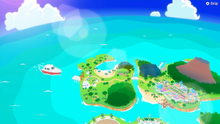Caresaway Island
From the Super Mario Wiki, the Mario encyclopedia
Jump to navigationJump to search
- “With its rich history and exotic wildlife, Caresaway Island is the ideal vacation spot! This luxury resort is full of fun activities for guests of all ages!”
- —Caresaway Island advertisement, WarioWare: Move It!
Caresaway Island is a major location and the main setting of WarioWare: Move It!. It is a tropical resort with multiple activities and amenities, and a vast history of the Form Stones. In the game's opening, Wario notices a burger vendor in Diamond City and orders 50 garlic burgers, granting him 50 chances to draw in a lottery where he gets the winning ticket: a voucher for a free vacation to Caresaway Island with nineteen of his friends, much to his dismay. His employees overhear his victory and they all set off to the island via a yacht. The name "Caresaway" is likely a portmanteau of "care" and "castaway", or derived from the phrase "put your cares away".
Areas
Activities
- Scuba diving
- Bus tour
- Surfing
- Caresaway Grand Prix
Gallery
Names in other languages
| Language | Name | Meaning | Notes |
|---|---|---|---|
| Japanese | バリオモロ島[?] Bariomoro Tō |
From「バリおもろい」(bari omoroi, Kansai dialect expression "extremely interesting") +「島」(-tō, island) | |
| Chinese (simplified) | 贝利尤易斯岛[?] Bèilì Yóuyìsī Dǎo |
From Japanese name and a homophone of「有意思」(yǒuyìsi, interesting) | |
| Chinese (traditional) | 貝利尤易斯島[?] Bèilì Yóuyìsī Dǎo |
From Japanese name and a homophone of「有意思」(yǒuyìsi, interesting) | |
| Dutch | Relaxië[?] | From "relaxen" (to relax) with the country name suffix "-ië" | |
| French | Île Funagogo[?] | From "île" (island) and "fun à gogo" (fun galore) | |
| German | Pati-Pati-Insel[?] | Pati-Pati Island; "Pati" is possibly a deformation of "Party" | |
| Italian | Isola Solospasso[?] | From "solo spasso" (just fun) and "isola" (island) | |
| Korean | 빅재미섬[?] Bigjaemi Seom |
Big-fun Island | |
| Spanish (NOA) | Isla Bullanga[?] | Ruckus Island | |
| Spanish (NOE) | Isla Solaz[?] | From "solazar" (to entertain) and "isla" (island) |

